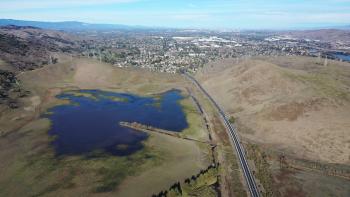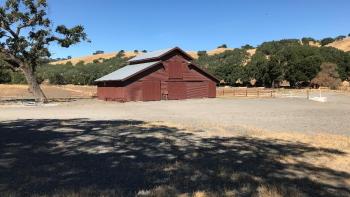Santa Clara Valley Habitat Agency, Santa Clara Valley Open Space Authority and Peninsula Open Space Trust Protect 1,861-Acre Tilton Ranch, Bringing Total Acres Protected Adjoining Coyote Valley to 2,900
Public-private collaboration preserves habitat for endangered native species, wildlife passage, grazing and critical watershed
MORGAN HILL, Calif. (October 6, 2020) – Santa Clara Valley Habitat Agency (Habitat Agency), Santa Clara Valley Open Space Authority (Authority) and Peninsula Open Space Trust (POST) today announced the purchase of 1,861 acres of Tilton Ranch, increasing permanently protected land to more than 2,900 acres adjacent to Coyote Valley, north of Morgan Hill. One of the largest remaining intact ranches in the South Bay, Tilton Ranch contains critical watershed for both Monterey and San Francisco Bays and is home to dozens of unique and endangered species, some of which occur only in this area.
Tilton Ranch borders the previously protected 603-acre Baird parcel acquired by the Habitat Agency in December 2019. To the north, it borders the existing 348acre Coyote Valley Open Space Preserve. Today’s acquisition significantly expands the open space that connects San Jose and Morgan Hill, providing numerous environmental benefits and potential recreational opportunities for citizens and municipalities throughout the region.
The Property History
Tilton Ranch borders the previously protected 603-acre Baird parcel acquired by the Habitat Agency in December 2019. To the north, it borders the existing 348acre Coyote Valley Open Space Preserve. Today’s acquisition significantly expands the open space that connects San Jose and Morgan Hill, providing numerous environmental benefits and potential recreational opportunities for citizens and municipalities throughout the region. Photo courtesy The Chickering Company The ranch opened in 1917, under the ownership of the Tilton family and their descendants, and has operated continuously since then. For much of that time, the land has been grazed with cattle and dryfarmed for hay and grain. Mining for cinnabar also took place on part of the property early in the 20th century, but that usage ceased following World War II. The ranch sits on ancestral lands of numerous Indigenous peoples, who stewarded the land for millennia and whose descendants, members of the Muwekma Ohlone Tribe and the Amah Mutsun Tribal Band, still reside in the region.
The Conservation Vision
Situated in the eastern foothills of the Santa Cruz Mountains, the expansive property has been a top conservation priority, cited in numerous regional plans and studies, for decades. It provides landscape linkages that help connect wildlife from the Santa Cruz Mountains in the west to the Diablo range in the east and the Gabilan range to the south. Protecting these pathways from development ensures viable wildlife passage between the ranges, which is essential to maintaining biodiversity in the entire region.
Tilton Ranch is also home to the headwaters of Fisher Creek, which flows north through Laguna Seca, the largest remaining freshwater wetland in Santa Clara County located in Coyote Valley, and into the San Francisco Bay. It also constitutes part of the Pajaro River watershed, which flows south to Monterey Bay.
The combined Tilton-Baird properties support thirteen natural land cover types, including habitat for five animal species and six California endemic plant species targeted for conservation by the Santa Clara Valley Habitat Agency. These include the endangered Bay checkerspot butterfly, threatened California red-legged frog, endangered foothill yellow-legged frog, threatened California tiger salamander, western pond turtle, threatened tricolored blackbird, western burrowing owl, fragrant fritillary, Loma Prieta hoita, most beautiful jewelflower, Mount Hamilton thistle and smooth lessingia.
“The Habitat Agency shares the family’s commitment to preserving the property’s ranching heritage, the rare and endangered habitat that exists on this property, as well as their wish to ensure the future of this place that is so iconic to the American West,” said Executive Officer Edmund Sullivan. “Our 2013 Habitat Plan specifically identified this area for conservation due to the 13 natural land cover types and known occurrences of endangered species on the ranch, plus the 5.8 miles of streams that are so vital to our area’s water supply. We are grateful to our partners for making this keystone acquisition possible.”
As it is today, the 1,861-acre Tilton Ranch property will remain a multi-use landscape, with habitat protection, continued conservation grazing and numerous possibilities for compatible outdoor public recreation. Due to sensitive species on the site, the Baird parcel, at 603 acres, will become a nature reserve with strictly limited public access.
“Tilton Ranch is an astonishing property with glorious hilltop views and grasslands that host many native species. In many ways, it’s a gateway to California’s past and – thanks to the seller’s commitment to protecting these natural resources – to its future as well,” said Walter T. Moore, president of POST. “We are especially grateful to our public and private funding partners, in particular the Gordon and Betty Moore Foundation. They have not only been generous with grants in support of our recent major Coyote Valley conservation purchases, but also have been exceptional partners in offering additional financing options when needed.”
“Tilton Ranch is one of the County’s largest working ranches, and protecting such a large natural and working landscape so close to our urban areas is so important for nature and people,” said Andrea Mackenzie, general manager for the Authority. “We look forward to stewarding this important landscape for all its conservation benefits and continuing the family’s ranching legacy.”
“This is one of the most significant Bay Area conservation acquisitions in recent memory,” said Dan Winterson, who manages the Bay Area Conservation Program at the Gordon and Betty Moore Foundation. “It would not have happened without truly effective collaboration among the partnering agencies, non-profits and funders, and we are thrilled to be able to support the permanent protection of Tilton Ranch.”


